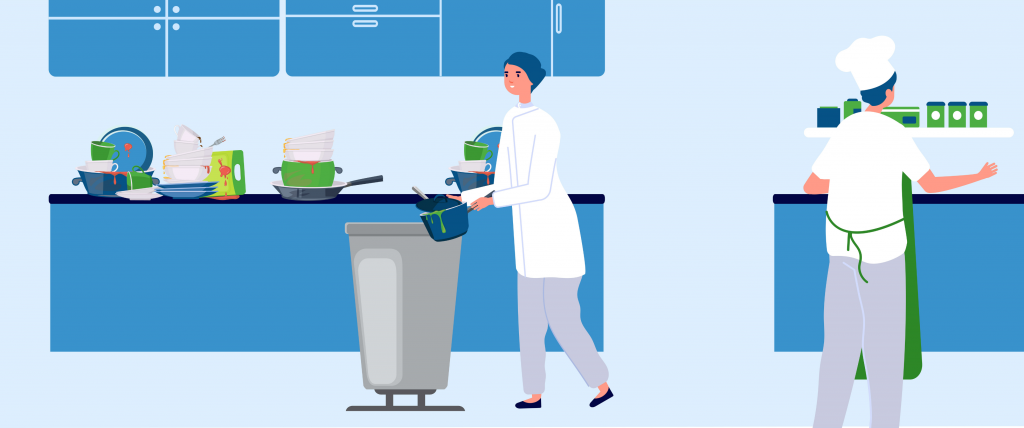How Often Should Waste Be Removed From Food Production Areas?
Whether you’re running a business that involves food preparation or a commercial kitchen, you need to uphold the highest standards of hygiene and food handling to ensure that your food is safe. This is part of your legal obligation, with dire consequences for your operations if you fail to meet industry standards.
This month at SCS Waste, we’re going to take a closer look at how often you should be removing waste from commercial kitchens and food preparation areas, as well as other aspects of food waste disposal that you need to know.

How often should waste be removed from a commercial kitchen?
When you run any kind of commercial kitchen or food preparation area, food waste should be removed immediately from surfaces into bins — pedal bins are ideal to ensure you don’t have to use your hands and risk contamination. As a rule, you should essentially be cleaning as you go.
The bins in your kitchen should be emptied regularly throughout the day to avoid pests and contamination in your food preparation area – they should never be left to overflow. Anyone emptying bins and disposing of waste should wash their hands immediately after in a dedicated handwashing sink area.
In the commercial sector, hotels, restaurants, pubs and other hospitality venues produce the most food waste, so you should be keeping a close eye on how you deal with this waste if you operate any of these business types. We’ll look at how kitchen waste should be disposed of later in this piece.
How often should waste be removed from a household kitchen?
If you’re a keen cooker and want to know how often you should be removing food waste from your kitchen, the answer is pretty much the same as above: as often as possible.
For a family home, this might be once every day or two due to your general bin filling up with household waste as well as kitchen waste. You should never let your bin overflow and, if you start to notice it smelling, it’s a pretty good sign to empty and clean the receptacle.
If you live in an area with separate food waste collection, you should ensure you’re regularly scraping food waste into the caddy before then closing the lid. You can then leave the caddy out on the appointed food waste collection day for it to be emptied.
How should commercial kitchen waste be disposed of?
For any commercial kitchen, there should be bins outside of the building for different waste types, from food waste to different recyclable materials. This means that you should be able to segregate waste into different bins and containers for disposal without contaminating the waste stream. These bins should be closed at all times and should remain clean, with regular rinsing and cleaning to maintain high standards and to avoid pests.
How to dispose of fat, oil and grease from a commercial kitchen
Clearly, for any commercial kitchen, there will be large quantities of fat, oil and grease as a byproduct of cooking. This cannot be put down your drains as it creates issues in your system, clogging up drains internally as well as externally, which can lead to bad smells, pest issues and pollution in the watercourse.
The fats and greases from your cooking should be contained and stored so that they can be collected and disposed of by an authorised collector. You must not take oil and grease from commercial kitchens to household recycling sites. Look to your local council for further guidance on how to dispose of commercial oil, grease and fat for your specific regulations.
Need help managing waste from your business in Arundel, Littlehampton, Bognor Regis and the surrounding areas? Contact our waste management team at SCS Waste today. We work with companies and organisations across the region to provide legal waste disposal, keeping your business safe and protecting the environment.
Call today for more help and advice in dealing with your business waste.

